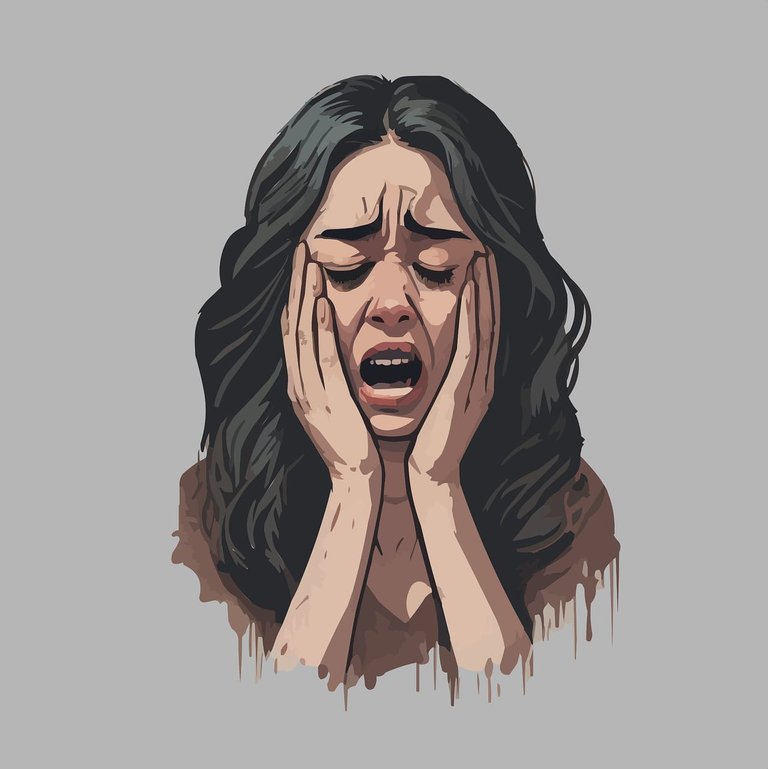Hello everyone! Am delighted to participate in this week's contest.
Depression and anxiety are two weighty, but invisible words. They are seen as a silent burden carried by millions of people all over the world, including you and me, and yes, even the people around us who seemingly looked strong and unbroken. A publication by Sousa et al. (2023), highlights that the World Health Organization (WHO) considers depression and anxiety as a global pandemic that leads to mental health issues. Furthermore, WHO asserted that over 264 million individuals worldwide are victims of this pandemic source Even at that, the stigma associated with it hasn’t simmered down, no, not anytime soon, as it continues to prevent countless people with mental health illness (depression and anxiety) from seeking proper medical help and all the necessary support they need. For example, in Nigerian society, where everyone is expected to be strong, people with these conditions are frequently labeled "weak" and "crazy," and they are concerned primarily with how their friends and family will perceive them. Indeed, this stigma is not alien to us. It has deep-rooted societal and cultural threads that traverse generations.
Societal barriers to mental health awareness
The dearth of understanding is one of the most profound barriers to mental health awareness in Nigeria. The Nigerian society generally misconstrues mental health-related cases as a clear sign of personality weakness, partial madness, as they call it or a sign that one has offended the gods, hence subjected to spiritual punishment. Honestly, we in this part of the world,tend to prioritize physical health over mental health, forgetting that it's the head that directs the body. No wonder why we hear phrases like “you full ground” (you look healthy) frequently used to emphasize physical health, while “my head no dey work well” which is a sign of mental distress is often dismissed and the speaker is rebuked for saying negative things about his or herself. If the individual involved dares to act as if he or she is not mentally balanced, he or she will be bundled, chained and taken to the traditional healer for spiritual cleansing. Now you understand why Anjorin, Omolayo Wada, and Yusuf Hassan conducted a 2022 survey on "The impact of traditional healers in the provision of mental health services in Nigeria." In their work, they concluded that about 70% of Nigerians believe that mental health issues are more of spiritual issues than medical issues, further complicating the stigma source.
Secondly, the way the media portrays mental health further exacerbates and eternalizes the derogatory stereotype of the illness. Mostly in our society, people with mental health issues are usually tagged unstable, violent, unpredictable, etc, making people to fear them more. If the media had ensured its threefold function of entertaining, informing and educating the public accurately. This stigma would not have lingered till date. It is because the media had not done its work properly that individuals struggling with mental health conditions are unable to come out to get the needed help and support, as they are afraid of people judging them based on these negative stereotypes. You cannot blame these individuals as most news reports usually link mental health issues to violence. This claim is supported by a 2020 study of Nigerian media reports on mental health violence. The report established that 65% of reportage on mental health issues is linked with violencesource, strengthening the dangerous misconceptions.
Culture-based barriers to mental health acceptability
The culture and traditions of our people play a pivotal role in the acceptance of mental health conditions. Mental health conditions are not to be mentioned in most cultures as it's considered a taboo. The most affected gender in Nigeria and Africa at large are the men, as they are usually expected to be stoic and strong. They cannot talk about their emotions, let alone mental health conditions. As a result of these cultural expectations, the men always feel embarrassed to talk about their mental health conditions for fear of being ostracized or labeled “crazy” or “mad”. This is accorded credence to by a survey conducted by the Nigerian Institute of Medical Research. The results of their findings justified that those with mental health issues in Nigeria are over 80% of the population. They further opine that these individuals cannot seek professional medical help, fearing unnecessary and unhealthy stigma.
Furthermore, religious beliefs can also contribute to the stigma. Most times mental health conditions are often seen by worshipers of some gods as a dire punishment from their sacred entity. In this case, friends and family will naturally encourage the individual involved to seek spiritual solutions to appease the gods. This can lead to delays in seeking proper medical treatment, thereby degenerating the situation. As important as faith may be in one's healing process, it's never a substitute for professional medical treatment.
The solution to the stigma
The stigma can be broken by adopting the following approaches.
This approach includes educating our people about mental health illness, having extensive discussions on mental health conditions, promoting mental health programs in our communities, etc.
To this end, we must do all we can collectively to dismantle the unnecessary stigma about mental health issues by showing compassion, empathy and our willingness to change our mindset. We must encourage individuals with mental health conditions to seek professional medical help as it is a sign of strength and not weakness.
Posted Using INLEO


You can check out this post and your own profile on the map. Be part of the Worldmappin Community and join our Discord Channel to get in touch with other travelers, ask questions or just be updated on our latest features.
Thank
Congratulations @etukakpan01! You have completed the following achievement on the Hive blockchain And have been rewarded with New badge(s)
Your next target is to reach 30 posts.
You can view your badges on your board and compare yourself to others in the Ranking
If you no longer want to receive notifications, reply to this comment with the word
STOPCheck out our last posts:
I also read somewhere that after the Corona pandemic, the WHO mentioned mental health is the biggest pandemic. I agree, education and awareness is the key to battle with the stigma.
Thank you very much for stopping by
Mental health issues is indeed the biggest and ongoing pandemic the world has ever faced and is still facing.
It’s heartbreaking that we went to not prioritize our mental health. The average Nigerian man is depressed and anxious on a normal day and so many factors contribute to this. But women also battle with anxiety and depression. The best way to handle this it to open up and seek help.
Thanks for sharing with us.